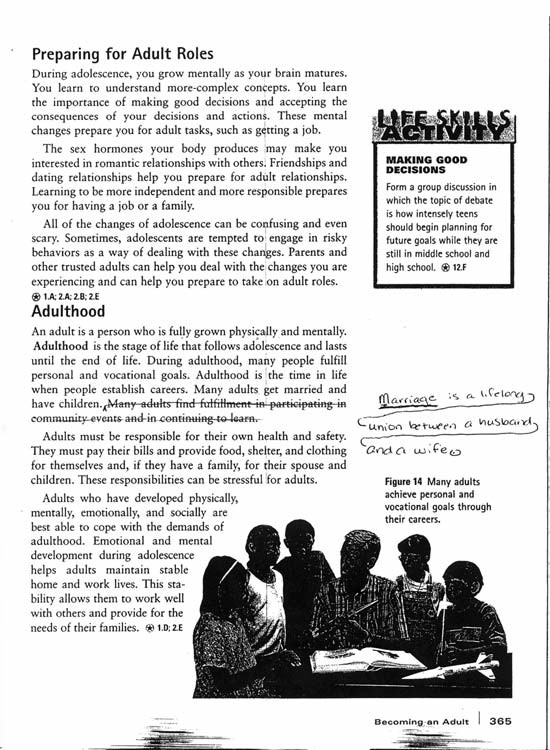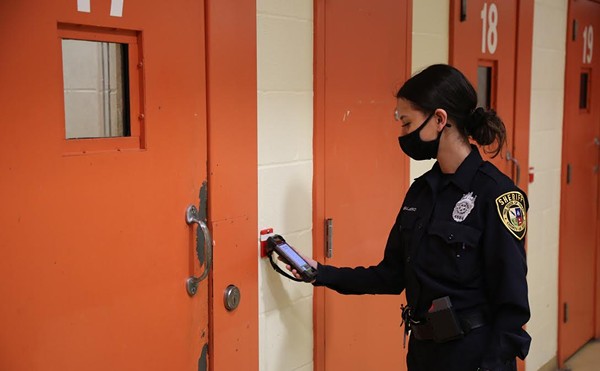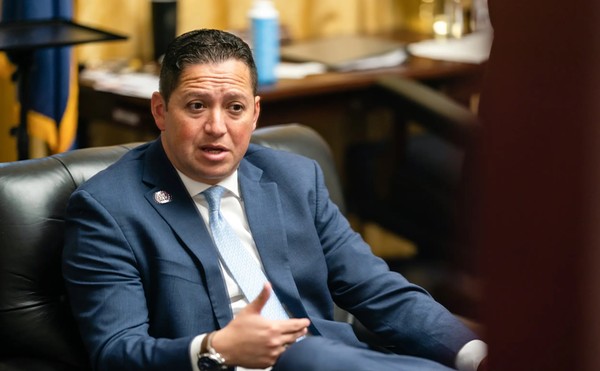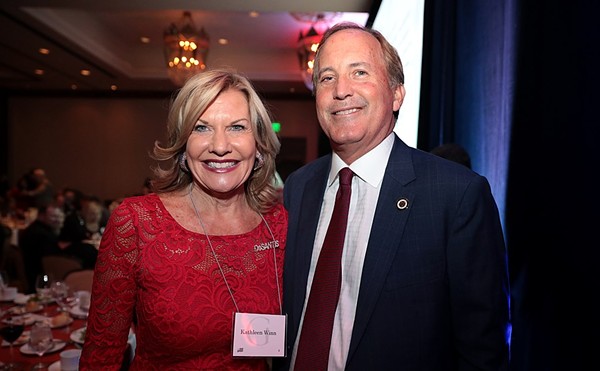|
State Board of Education places politics before education On November 5, the Texas State Board of Education voted to approve four new health textbooks, all of which contain - to the dismay of many, including some of its own members - the last-minute addition of language that defines marriage as "a lifelong union between a husband and wife." And, despite the best efforts of hundreds of concerned parents and teens who lobbied this summer for more comprehensive sex education, the textbooks provide nary a reference to barrier contraception, promoting instead an abstinence-only approach. The books have been criticized, mourned, and lampooned by onlookers, but considering the political tone of the country, is the board's action that surprising? "I'll be honest with you, the outcome of the election does have an impact on the tone that is set throughout the textbook debate," said Jennifer Bilbrey director of government affairs at Planned Parenthood. "That's why you saw it happen on the third day after the election. And I think we may see this continue to happen." This is not my beautiful family The SBOE's attack on same-sex marriage was the brainchild of Republican board member Terri Leo of Spring, who ran unopposed for re-election this year. She will serve another four-year term, beginning in January. Although Leo did not respond to repeat phone calls from the Current, she has been quoted as saying that the changes were based on her objection to "asexual stealth phrases" like "individuals who marry." Leo asked for two other changes that were rejected by the publishers: "Opinions vary on why homosexuals, lesbians, and bisexuals as a group are more prone to self-destructive behaviors like depression, illegal drug use, and suicide" "If you discuss homosexuality in class, be aware that Texas law rejects homosexual 'marriage.' Students can therefore maintain that heterosexuality and homosexuality are not moral equivalents, without being charged with 'hate speech.'" Board member Mary Helen Berlanga, a Democrat from Corpus Christi, says the books' heterosexual messages were clear before the changes. "I looked through the book and all I could find was a picture of a husband, a wife and two kids," she says. "There was one with three girls standing near three boys. Do they think the girls are not with their dates? Do they think they are three lesbians?" Although she expressed her incredulity and concern to fellow board members, she was vastly out-numbered as the board voted 10-4 against approving the books without the changes. Siding with Berlanga were Democrats Mavis Knight of Dallas, Joe Bernal of San Antonio, and Renee Nunez of El Paso.
What seems to concern Berlanga most is that by entertaining Leo's demands, the board stepped outside its authority: The Texas Legislature doesn't allow the board to decide content. "We are only supposed to require changes if the text is not in line with Texas Essential Knowledge Standards, if the book bindings are falling apart, or if there are factual errors. We are not supposed to be rewriting the book according to our own whims or political agenda." The only check on that authority would come from the citizens - who, due to the last-minute nature of the changes did not get to weigh in - or from the publishers who, while refusing to make two of the other changes demanded by Leo, did not find the addition of a marriage definition unreasonable. "Texas law doesn't recognize marriage between persons of the same sex," says April Hatori vice president of communications at Glencoe/McGraw Hill. "So, in response to concerns expressed by the board, Glencoe agreed to make a very small number of changes in reference to marriage." Glencoe, publisher of two of the approved books, has not determined if it will include the changes in its national editions. Hatori says its author and editorial teams will make that decision. Rick Blake, a spokesman for Holt, Rinehart, and Winston, the other publisher, says it will not include the changes in the national editions of its books.
Be that as it may, the danger now is that Texas has set a precedent for other states with similarly conservative agendas who could follow suit in setting politics and ideology above science, and ultimately, the health of their children: "It will have an impact, because there will be some places that will want it exactly the way that Texas has it. So that's the downside you know," Berlanga says. The other downside is that Texas' teens are now stuck with a textbook that focuses so much on excluding various sexual orientations that it provides only the narrowest definition of family. "What's disappointing to me is not just that a definition that will demean or discourage gay teens is in the books," explains Bilbrey. "But that it also demeans all kinds of other Texans who parent in different ways. We have kids in school who are the products of single moms and all kinds of different family relationships, who will look at that definition and think - that's not where I come from." Stone Age sex ed In regards to sex education, Berlanga says that she felt "pretty satisfied with the books" because contraceptive charts - including failure rates and STD protection stats for various forms of birth control - are included in the teacher editions and supplemental materials, available with the books at no extra charge. While that means that instructors can teach it, and school districts can provide students with the supplemental materials, it also means they can choose not to. Do you have a teacher that uses the supplementary materials or not? Are you in a school district that uses the abstinence-only Worth the Wait program, or are you in one that has a health advisory council with parents who want more comprehensive sex education in their school? In other words, it might come down to the discretion of an individual, "which is scary because once again it leaves it up to the most vocal in the community," says Bilbrey. Like many, she expresses sadness and outrage "that Texas teens will be subjected to books that are incomplete," but also disappointment. "So often, we hear from the other side during the legislative session. This summer it felt good because so many people spoke out for comprehensive sex education. But the board just completely ignored them." Texas leads the nation in teen birthrates, the percentage of children without health insurance, and ranks 43rd in percentage of teens dropping out of high school. "It feels to me like we can do better than this," says Bilbrey. You and your school district It will be another 10 years before Texas reevaluates health textbooks. However, it is not too late to write and tell the publishers that the controversy over same-sex marriage doesn't belong in children's health classes. It could persuade them not to adding Leo's definition of marriage to the national editions of their books. Both Bilbrey and Berlanga encourage parents to lobby the school district and their teen's school to make sure the comprehensive sex education portion of the teacher's edition is being taught, and that supplementary materials are being distributed. In addition, Bilbrey says, every school district is required by law to have a school health advisory council, appointed by the Department of State Health Services, whose charge includes recommending course materials related to human sexuality, including STDs, HIV, and human reproduction. The council is made up of physicians from both the community and the schools; parents; school administers; and members of children's health organizations. Parents can contact or join the school health advisory council. E-mail [email protected] for more information. • By Susan Pagani
|
Tags:

KEEP SA CURRENT!
Since 1986, the SA Current has served as the free, independent voice of San Antonio, and we want to keep it that way.
Becoming an SA Current Supporter for as little as $5 a month allows us to continue offering readers access to our coverage of local news, food, nightlife, events, and culture with no paywalls.
Scroll to read more San Antonio News articles
Newsletters
Join SA Current Newsletters
Subscribe now to get the latest news delivered right to your inbox.

















